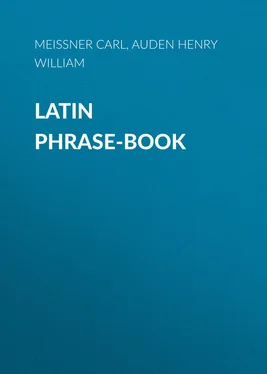Carl Meissner - Latin Phrase-Book
Здесь есть возможность читать онлайн «Carl Meissner - Latin Phrase-Book» — ознакомительный отрывок электронной книги совершенно бесплатно, а после прочтения отрывка купить полную версию. В некоторых случаях можно слушать аудио, скачать через торрент в формате fb2 и присутствует краткое содержание. Жанр: foreign_antique, foreign_prose, на латинском языке. Описание произведения, (предисловие) а так же отзывы посетителей доступны на портале библиотеки ЛибКат.
- Название:Latin Phrase-Book
- Автор:
- Жанр:
- Год:неизвестен
- ISBN:нет данных
- Рейтинг книги:5 / 5. Голосов: 1
-
Избранное:Добавить в избранное
- Отзывы:
-
Ваша оценка:
- 100
- 1
- 2
- 3
- 4
- 5
Latin Phrase-Book: краткое содержание, описание и аннотация
Предлагаем к чтению аннотацию, описание, краткое содержание или предисловие (зависит от того, что написал сам автор книги «Latin Phrase-Book»). Если вы не нашли необходимую информацию о книге — напишите в комментариях, мы постараемся отыскать её.
Latin Phrase-Book — читать онлайн ознакомительный отрывок
Ниже представлен текст книги, разбитый по страницам. Система сохранения места последней прочитанной страницы, позволяет с удобством читать онлайн бесплатно книгу «Latin Phrase-Book», без необходимости каждый раз заново искать на чём Вы остановились. Поставьте закладку, и сможете в любой момент перейти на страницу, на которой закончили чтение.
Интервал:
Закладка:
9. Assistance – Deliverance – Consolation
auxilium, opem, salutem ferre alicui – to bring aid to; to rescue.
auxilio alicui venire – to come to assist any one.
alicuius opem implorare – to implore a person's help.
confugere ad aliquem or ad opem, ad fidem alicuius – to fly to some one for refuge.
ad extremum auxilium descendere 70 70 Similarly descendere is frequently used of consenting unwillingly to a thing, condescending. Cf. vi. 9 ad fin. and xvi. 9.
– to be reduced to one's last resource.
auxilium praesens 71 71 Notice too poena praesens , instant punishment; pecunia praesens , ready money; medicina praesens , efficacious remedy; deus praesens , a propitious deity; in rem praesentem venire , to go to the very spot to make a closer examination.
– prompt assistance.
adesse alicui or alicuius rebus (opp. deesse ) – to assist, stand by a person.
salutem alicui afferre – to deliver, rescue a person.
saluti suae consulere, prospicere – to take measures for one's safety; to look after one's own interests.
suis rebus or sibi consulere – to take measures for one's safety; to look after one's own interests.
salutem expedire – to effect a person's deliverance.
solacium praebere – to comfort.
nihil habere consolationis – to afford no consolation.
hoc solacio frui, uti – to solace oneself with the thought…
consolari aliquem de aliqua re – to comfort a man in a matter; to condole with him.
consolari dolorem alicuius – to soothe grief.
consolari aliquem in miseriis – to comfort in misfortune.
hoc (illo) solacio me consōlor – I console myself with…
haec (illa) res me consolatur – I console myself with…
10. Riches – Want – Poverty
divitiis, copiis abundare – to be rich, wealthy.
magnas opes habere – to be very rich; to be in a position of affluence.
opibus maxime florere – to be very rich; to be in a position of affluence.
omnibus opibus circumfluere – to be very rich; to be in a position of affluence.
fortunis maximis ornatum esse – to be in the enjoyment of a large fortune.
in omnium rerum abundantia vivere – to live in great affluence.
aliquem ex paupere divitem facere – to raise a man from poverty to wealth.
inopia alicuius rei laborare, premi – to suffer from want of a thing.
ad egestatem, ad inopiam (summam omnium rerum) redigi – to be reduced to (abject) poverty.
vitam inopem sustentare, tolerare – to earn a precarious livelihood.
in egestate esse, versari – to live in poverty, destitution.
vitam in egestate degere – to live in poverty, destitution.
in summa egestate or mendicitate esse – to be entirely destitute; to be a beggar.
stipem colligere – to beg alms.
stipem (pecuniam) conferre – to contribute alms.
11. Utility – Advantage – Harm – Disadvantage
usui or ex usu esse – to be of use.
utilitatem afferre, praebere – to be serviceable.
multum (nihil) ad communem utilitatem afferre – to considerably (in no way) further the common good.
aliquid in usum suum conferre – to employ in the furtherance of one's interests.
omnia ad suam utilitatem referre – to consider one's own advantage in everything.
rationibus alicuius prospicere or consulere (opp. officere, obstare, adversari ) – to look after, guard a person's interests, welfare.
commodis alicuius servire – to look after, guard a person's interests, welfare.
commoda alicuius tueri – to look after, guard a person's interests, welfare.
meae rationes ita tulerunt – my interests demanded it.
fructum (uberrimum) capere, percipere, consequi ex aliqua re 72 72 Also fructum alicuius rei capere, percipere, ferre, consequi ex aliqua re – e.g. virtutis fructus ex re publica (magnos, laetos, uberes) capere = to be handsomely rewarded by the state for one's high character.
– to derive (great) profit , advantage from a thing.
fructus ex hac re redundant in or ad me – (great) advantage accrues to me from this.
aliquid ad meum fructum redundat – I am benefited by a thing.
quid attinet? with Infin. – what is the use of?
cui bono? – who gets the advantage from this? who is the interested party?
damnum (opp. lucrum ) facere – to suffer loss, harm, damage. 73 73 Notice too calamitatem, cladem, incommodum accipere , to suffer mishap, reverse, inconvenience; naufragium facere , to be shipwrecked.
damno affici – to suffer loss, harm, damage.
detrimentum capere, accipere, facere – to suffer loss, harm, damage.
iacturam 74 74 damnum (opp. lucrum ) = loss, especially of worldly possessions; detrimentum (opp. emolumentum ) = harm inflicted by others; fraus = deceitful injury; iactura (properly "throwing overboard") = the intentional sacrifice of something valuable in order either to avert injury or to gain some greater advantage. "Harmful" = inutilis, qui nocet , etc., not noxius , which is only used absolutely – e.g. homo noxius , the offender, evildoer.
alicuius rei facere – to throw away, sacrifice.
damnum inferre, afferre alicui – to do harm to, injure any one.
damnum ferre – to know how to endure calamity.
incommodo afficere aliquem – to inconvenience, injure a person.
incommodis mederi – to relieve a difficulty.
damnum or detrimentum sarcire (not reparare ) – to make good, repair a loss or injury.
damnum compensare cum aliqua re – to balance a loss by anything.
res repetere – to demand restitution, satisfaction.
res restituere – to give restitution, satisfaction.
12. Goodwill – Kindness – Inclination – Favour
benevolo animo esse in aliquem – to be well-disposed towards…
benevolentiam habere erga aliquem – to be well-disposed towards…
benevolentiam, favorem, voluntatem alicuius sibi conciliare or colligere (ex aliqua re) – to find favour with some one; to get into their good graces.
benevolentiam alicui praestare, in aliquem conferre – to show kindness to…
benevolentia aliquem complecti or prosequi – to show kindness to…
gratiosum esse alicui or apud aliquem – to be popular with; to stand well with a person.
in gratia esse apud aliquem – to be popular with; to stand well with a person.
multum valere gratia apud aliquem – to be highly favoured by; to be influential with…
florere gratia alicuius – to be highly favoured by; to be influential with…
gratiam inire ab aliquo or apud aliquem – to gain a person's esteem, friendship.
in gratiam alicuius venire – to gain a person's esteem, friendship.
gratiam alicuius sibi quaerere, sequi , more strongly aucupari – to court a person's favour; to ingratiate oneself with…
Читать дальшеИнтервал:
Закладка:
Похожие книги на «Latin Phrase-Book»
Представляем Вашему вниманию похожие книги на «Latin Phrase-Book» списком для выбора. Мы отобрали схожую по названию и смыслу литературу в надежде предоставить читателям больше вариантов отыскать новые, интересные, ещё непрочитанные произведения.
Обсуждение, отзывы о книге «Latin Phrase-Book» и просто собственные мнения читателей. Оставьте ваши комментарии, напишите, что Вы думаете о произведении, его смысле или главных героях. Укажите что конкретно понравилось, а что нет, и почему Вы так считаете.

![Рис Хьюз - Madonna Park[e-book - рассказы]](/books/94285/ris-hyuz-madonna-park-e-book-rasskazy-thumb.webp)










